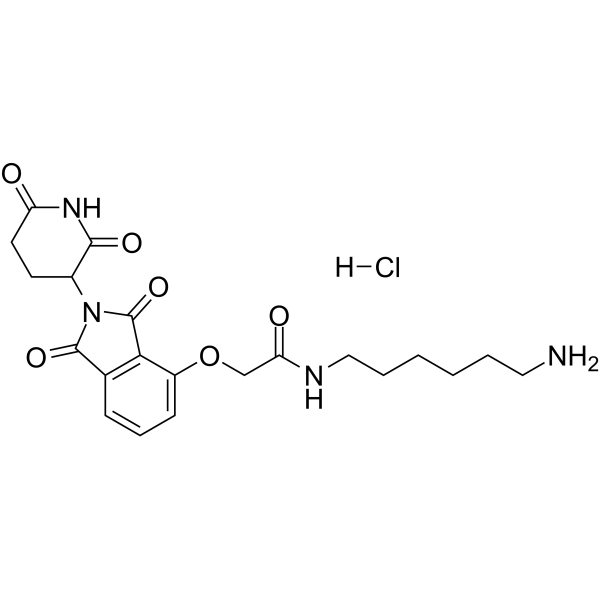
Thalidomide-O-amido-C6-NH2 hydrochloride
CAS No. 2376990-31-5
Thalidomide-O-amido-C6-NH2 hydrochloride ( —— )
产品货号. M27019 CAS No. 2376990-31-5
沙利度胺-O-酰胺基-C6-NH2 盐酸盐是一种合成的 E3 连接酶配体-接头缀合物,其中包含基于沙利度胺的 cereblon 配体和接头。它可用于PROTAC的合成。
纯度: >98% (HPLC)
 COA
COA
 Datasheet
Datasheet
 HNMR
HNMR
 HPLC
HPLC
 MSDS
MSDS
 Handing Instructions
Handing Instructions
| 规格 | 价格/人民币 | 库存 | 数量 |
| 5MG | ¥3038 | 有现货 |


|
| 10MG | ¥4512 | 有现货 |


|
| 25MG | ¥7266 | 有现货 |


|
| 50MG | ¥9963 | 有现货 |


|
| 100MG | ¥13365 | 有现货 |


|
| 500MG | ¥26649 | 有现货 |


|
| 1G | 获取报价 | 有现货 |


|
生物学信息
-
产品名称Thalidomide-O-amido-C6-NH2 hydrochloride
-
注意事项本公司产品仅用于科研实验,不得用于人体或动物的临床与诊断
-
产品简述沙利度胺-O-酰胺基-C6-NH2 盐酸盐是一种合成的 E3 连接酶配体-接头缀合物,其中包含基于沙利度胺的 cereblon 配体和接头。它可用于PROTAC的合成。
-
产品描述Thalidomide-O-amido-C6-NH2 hydrochloride is a synthesized E3 ligase ligand-linker conjugate that incorporates the Thalidomide based cereblon ligand and a linker. It can be used in the synthesis of PROTACs.(In Vitro):PROTACs contain two different ligands connected by a linker; one is a ligand for an E3 ubiquitin ligase and the other is for the target protein. PROTACs exploit the intracellular ubiquitin-proteasome system to selectively degrade target proteins.
-
体外实验PROTACs contain two different ligands connected by a linker; one is a ligand for an E3 ubiquitin ligase and the other is for the target protein. PROTACs exploit the intracellular ubiquitin-proteasome system to selectively degrade target proteins.
-
体内实验——
-
同义词——
-
通路Others
-
靶点Other Targets
-
受体P450
-
研究领域——
-
适应症——
化学信息
-
CAS Number2376990-31-5
-
分子量466.92
-
分子式C21H27ClN4O6
-
纯度>98% (HPLC)
-
溶解度——
-
SMILESCl.NCCCCCCNC(=O)COc1cccc2C(=O)N(C3CCC(=O)NC3=O)C(=O)c12
-
化学全称——
运输与储存
-
储存条件(-20℃)
-
运输条件With Ice Pack
-
稳定性≥ 2 years
参考文献
1.Levron, J.C., et al. Pharmacokinetic study of 2,3-dichloro 4- (2-thienyl keto14C) phenoxyacetic acid (tienilic acid) in animals. European Journal of Drug Metabolism and Pharmacokinetics 2, 107–120 (1977).
产品手册




关联产品
-
Debilon
Debilon shows cytotoxic activity against P-388 cells.
-
Astragalin
黄芪甲苷可通过抑制气道中自噬体的形成,有效缓解 ROS 促进的支气管纤维化。
-
Ethacridine lactate ...
依沙吖啶乳酸酯一水合物是一种基于吖啶的芳香族有机化合物,用作防腐剂。



 021-51111890
021-51111890 购物车()
购物车()
 sales@molnova.cn
sales@molnova.cn







